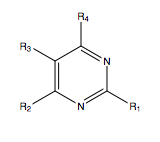VEGFR-2 inhibitor
A VEGFR-2 inhibitor is a type of tyrosine kinase inhibitor that specifically targets the vascular endothelial growth factor receptor 2 (VEGFR-2). VEGFR-2 is a key receptor involved in the process of angiogenesis, which is the formation of new blood vessels. Inhibiting VEGFR-2 can therefore be an effective strategy in the treatment of various cancers, as it can reduce the blood supply to tumors, inhibiting their growth and metastasis.
Mechanism of Action[edit | edit source]
VEGFR-2 inhibitors work by blocking the ATP binding site of the receptor, preventing its activation. This inhibition disrupts the downstream signaling pathways that promote endothelial cell proliferation and migration, which are essential for angiogenesis. By inhibiting these pathways, VEGFR-2 inhibitors can effectively reduce tumor vascularization and growth.
Chemical Classes[edit | edit source]
VEGFR-2 inhibitors belong to several chemical classes, each with distinct structural characteristics. Some of the notable classes include:
Quinazoline Derivatives[edit | edit source]
Quinazoline derivatives are a prominent class of VEGFR-2 inhibitors. These compounds typically feature a quinazoline core, which is crucial for their binding affinity to the receptor.
Indole Derivatives[edit | edit source]
Indole derivatives are another class of compounds that have shown efficacy in inhibiting VEGFR-2. The indole moiety is often modified to enhance selectivity and potency.
Pyrimidine Derivatives[edit | edit source]
Pyrimidine derivatives are characterized by a pyrimidine ring, which is essential for their interaction with the VEGFR-2 ATP binding site.
Pyridine Derivatives[edit | edit source]
Pyridine derivatives are also used as VEGFR-2 inhibitors. The pyridine ring contributes to the binding and inhibitory activity of these compounds.
Urea Derivatives[edit | edit source]
Urea derivatives are a class of VEGFR-2 inhibitors that utilize a urea linkage to enhance binding to the receptor.
Quinalone Derivatives[edit | edit source]
Quinalone derivatives are another group of compounds that have been developed as VEGFR-2 inhibitors, featuring a quinalone core structure.
Clinical Applications[edit | edit source]
VEGFR-2 inhibitors are primarily used in the treatment of various types of cancer, including renal cell carcinoma, hepatocellular carcinoma, and thyroid cancer. These inhibitors are often used in combination with other therapeutic agents to enhance their efficacy.
Related Pages[edit | edit source]
Search WikiMD
Ad.Tired of being Overweight? Try W8MD's physician weight loss program.
Semaglutide (Ozempic / Wegovy and Tirzepatide (Mounjaro / Zepbound) available.
Advertise on WikiMD
|
WikiMD's Wellness Encyclopedia |
| Let Food Be Thy Medicine Medicine Thy Food - Hippocrates |
Translate this page: - East Asian
中文,
日本,
한국어,
South Asian
हिन्दी,
தமிழ்,
తెలుగు,
Urdu,
ಕನ್ನಡ,
Southeast Asian
Indonesian,
Vietnamese,
Thai,
မြန်မာဘာသာ,
বাংলা
European
español,
Deutsch,
français,
Greek,
português do Brasil,
polski,
română,
русский,
Nederlands,
norsk,
svenska,
suomi,
Italian
Middle Eastern & African
عربى,
Turkish,
Persian,
Hebrew,
Afrikaans,
isiZulu,
Kiswahili,
Other
Bulgarian,
Hungarian,
Czech,
Swedish,
മലയാളം,
मराठी,
ਪੰਜਾਬੀ,
ગુજરાતી,
Portuguese,
Ukrainian
Medical Disclaimer: WikiMD is not a substitute for professional medical advice. The information on WikiMD is provided as an information resource only, may be incorrect, outdated or misleading, and is not to be used or relied on for any diagnostic or treatment purposes. Please consult your health care provider before making any healthcare decisions or for guidance about a specific medical condition. WikiMD expressly disclaims responsibility, and shall have no liability, for any damages, loss, injury, or liability whatsoever suffered as a result of your reliance on the information contained in this site. By visiting this site you agree to the foregoing terms and conditions, which may from time to time be changed or supplemented by WikiMD. If you do not agree to the foregoing terms and conditions, you should not enter or use this site. See full disclaimer.
Credits:Most images are courtesy of Wikimedia commons, and templates, categories Wikipedia, licensed under CC BY SA or similar.
Contributors: Prab R. Tumpati, MD




